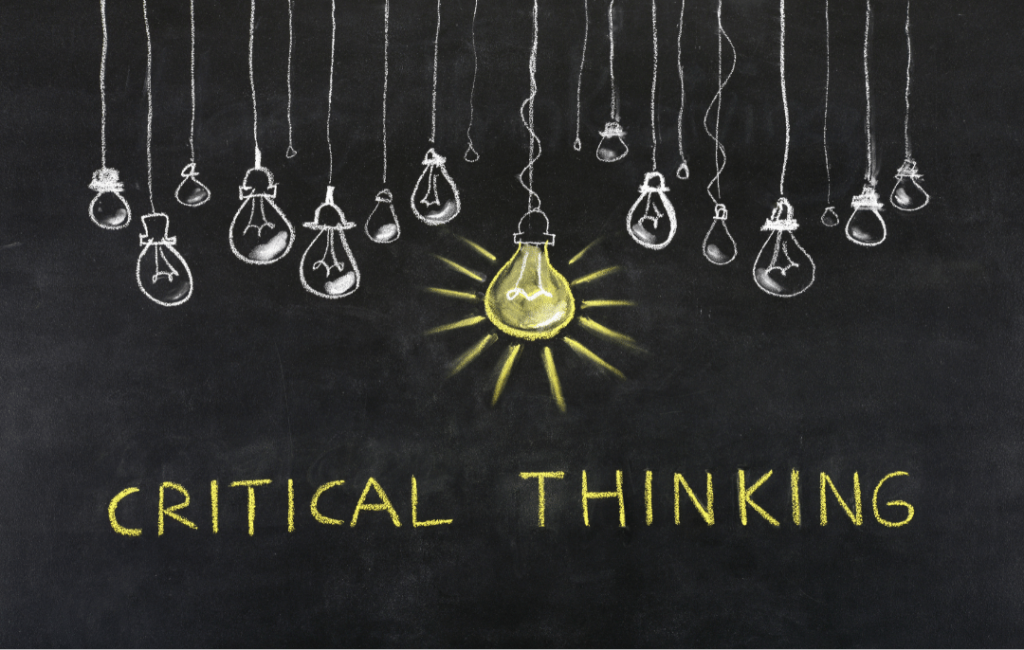Education & Career Trends: October 6, 2024
Curated by the Knowledge Team of ICS Career GPS

Content Credit:
- Article by Cassandra Miasnikov, published on insider.com. Original article link.
Critical thinking happens when you engage in reflective and independent thinking, instead of making sweeping generalisations or falling prey to cognitive biases like stereotyping. For instance, you’re thinking critically when deciding whether a story is credible by analysing and evaluating all the information you find rather than only considering one perspective. Consequently, critical thinkers often have a more balanced and rational view of the world.
Critical thinking is an important ability which can benefit your career, emotional health, and overall well-being.
What are the benefits of critical thinking?
Since critical thinking involves analysing and evaluating all information available to you, it can help you better understand others and cultivate your own empathy.
Critical thinking skills can help you:
- Succeed in undergraduate and graduate school, across disciplines.
- Identify reliable sources of information.
- Understand your own biases to better understand yourself and those around you.
- Stay invaluable in a fast-paced or knowledge-driven workplace. Critical thinking is considered a top skill for success in the fastest-growing jobs.
- Improve other life skills like communication, creativity, and self-reflection.
Critical thinking can have benefits across multiple areas of life.
Here are some expert suggested strategies to help boost your critical thinking skills.
1. Slow down and ask more questions
- If you have doubts, ask yourself more questions.
- Doing so can help you decide if these doubts and concerns are warning you about something important.
- Thinking critically about certain situations and behaviours can help you break things off if needed to avoid slumps and roadblocks in the future.
- You might find you’ve been engaging in wishful thinking, where your hopes about a particular person or situation get in the way of any tell-tale warning signs.
2. Say no to the status quo
- You might feel tempted to hop on board with the latest viral trend. But by challenging the status quo, you can boost your critical thinking skills.
To challenge the status quo in any circumstance, ask yourself these questions :
- “Are the claims too good to be true or otherwise unrealistic?”
- “Have you seen similar claims made before?”
3. Do your own fact-checking
- You may not always have enough information on hand to make an informed decision in the moment.
- Be willing to do more research on something if you’re not sure.
Thinking critically involves checking for signs of inaccuracy and errors, such as:
- A lack of references
- Sponsored content
- Biased content, for example a supplement company stating their supplements are the solution to your health ailments
4. Consider long-term consequences
- Considering how a decision might affect your future can help you make more informed decisions today.
- Look beyond the immediate situation. Something that might be advantageous now might not be in the future.
- This can be particularly important when making big decisions like: moving to a new city, selling your home, saying yes to a new job.
- For instance, if you have two job offers where one involves more hours but higher pay than the other, then you’ll need to decide whether you value financial security over more free time, or vice versa.
- You may also want to evaluate the day-to-day responsibilities and people you’ll work with closely.
5. Practice mindfulness
- Mindfulness is a type of meditation where you focus on your present thoughts, feelings, body, and environment through an accepting and non-judgmental lens.
- In short, you let go of “good thoughts” and “bad thoughts,” along with ruminations on the past or fixations on the future.
- Mindfulness can help you develop self-control, knowledge, and wisdom by improving your attention and emotional regulation.
- It can help boost critical thinking by helping you increase your attention span and better understand your biases.
6. Improve your skills with outside help
- Like any other skill, critical thinking can improve the more you practice it.
- Just know it’s not unusual to hit a wall and find it tough to further critical thinking skills on your own.
- The discomfort and difficulty of thinking enhance your capacity for critical thought and problem-solving.
- A mental health professional can offer guidance on developing critical thinking skills when you find yourself stuck.
- Many therapeutic approaches are based in looking at and changing how a client thinks about certain things in their life, so therapy can be a great resource for developing new ways of thinking.
…
Have you checked out yesterday’s blog yet
OpenAI’s “Revolutionary” o1 Model Has A Fatal Flaw
(Disclaimer: The opinions expressed in the article mentioned above are those of the author(s). They do not purport to reflect the opinions or views of ICS Career GPS or its staff.)
Like this post? For more such helpful articles, click on the button below and subscribe FREE to our blog.




One Reply to “6 tips for boosting critical thinking skills ”